 What Is a VPN?
What Is a VPN?
A Virtual Private Network (VPN) is a group of computers and or networks working together that allow users to use a Private Network to communicate over a public network, usually the internet. This includes not only the WWW like websites but also webmail and FTP transmissions among others. It is created by first establishing a virtual point-to-point connection through the use of dedicated connections. Using a set of protocols like tunneling, and traffic encryption, users can transmit data in complete anonymity.
Why Would You Use a VPN
Reason #1
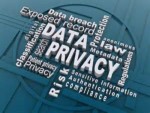 The Number one reason is privacy. A VPN uses an encrypted tunnel to protect transmissions including email, instant messaging, your browsing history and even VOIP (Voice Over Internet Protocol) from or to anyone. If someone tries to intercept your identity, you are protected. Even if an individual or the government were to intercept the message you would still remain unknown because your IP address is masked.
The Number one reason is privacy. A VPN uses an encrypted tunnel to protect transmissions including email, instant messaging, your browsing history and even VOIP (Voice Over Internet Protocol) from or to anyone. If someone tries to intercept your identity, you are protected. Even if an individual or the government were to intercept the message you would still remain unknown because your IP address is masked.
Reason #2
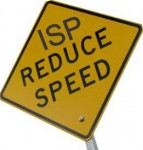
Reason #3
The next reason for using VPN is in situations typical for students or corporate workers wishing to keep their data private. They might be required to use a VPN, usually provided to them by their company or school. This protects any transmissions and keeps the user and institution safe. This is particularly useful when they are working in foreign countries that might not approve of the content.
Reason #4
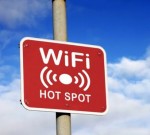 A big plus of VPN is when you are using a public Wi-Fi such as those found in coffee shops, hospitals, and airports, to name a few. Users would benefit from the use of VPN to keep not only their data but private information hidden from prying eyes in very public situations. Personally, I would never access any social site from a public Wi-Fi without a VPN.
A big plus of VPN is when you are using a public Wi-Fi such as those found in coffee shops, hospitals, and airports, to name a few. Users would benefit from the use of VPN to keep not only their data but private information hidden from prying eyes in very public situations. Personally, I would never access any social site from a public Wi-Fi without a VPN.
Reason #5
 If you live in a country that does not provide access to some public television, legal software or other media content, using a VPN makes your position on the internet invisible so you are not restricted or censored and therefore cannot be blocked by the service or censoring government.
If you live in a country that does not provide access to some public television, legal software or other media content, using a VPN makes your position on the internet invisible so you are not restricted or censored and therefore cannot be blocked by the service or censoring government.
How a VPN Really Works
As mentioned earlier, using a VPN creates a secure, encrypted tunnel that hides your actual IP address and location. Not knowing these two bits of information makes it virtually impossible for your ISP, hacker, malicious software or even something as benign as a marketing company from monitoring your online activities. In addition, most paid VPN software companies never keep logs so there is no possible way to determine online history. The graphic below is from PureVPN but actually all VPN traffic functions the same. Providers offer different services, speed, and the number of servers used. 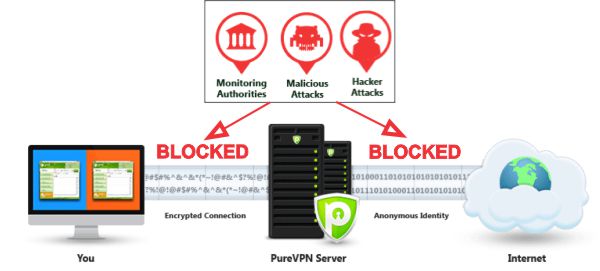
VPN Providers.
There are several VPN providers to choose and it is not hard to get a list from your favorite search engine. There are a ton of sites that offer the 10 or 5 best VPN providers and depending on who is producing the site the top 10 may change. It is important to remember that ALL VPN providers will slow your service slightly. This is because the number and distance of the relays your transmission has to travel through is considerably more than a non VPN connection. We are only talking a second or two but it is noticeable if you do not have a decent bandwidth through your provider.
PureVPN
Normally, I do not single out a right or wrong service and unless I tried every one of them I don’t think I could do it honestly.
However, I have used a few of them and I am personally happy with PureVPN. I am mentioning this because right now PureVPN is offering a 65% discount on a one-year subscription. For only $4.16 a month they will provide service on up to 5 multiple logins with one account. That is basically an unlimited number of devices as long as only 5 are logged in at one time. They claim to have the fastest VPN service and while I don’t know if that is true, it is the fastest I have used.
On their site today I noticed that they have a new feature called Virtual Router for Window applications. This will allow you to convert your Windows-based desktop or laptop into a virtual router and you may use it to connect up to 10 devices.
Summary
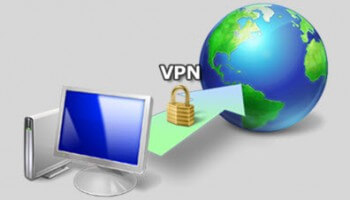
Finally, in my previous article, I mentioned the use of Tor as a browser for keeping your online activities hidden. When coupled with VPN you may consider yourself a ghost online.
- Further reading: How To Use TOR to Surf Anonymously
Jim
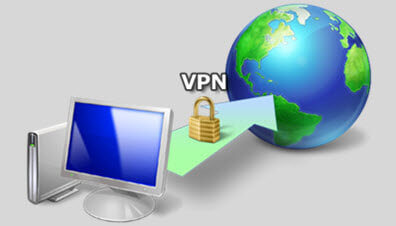


An excellent article Jim. Personally recommend Trust Zone and Cyber Ghost, Mindblower!
tried and like them both. When I used Trust Zone, I don’t remember it being that inexpensive. nice price.
If you want a VPN, here is a 1 year subscription, FREE–https://www.okayfreedom.com/specials/chip0216/of
Or- https://addons.mozilla.org/en-US/firefox/addon/hoxx-vpn-proxy/
or –https://chrome.google.com/webstore/detail/zenmate-security-privacy/fdcgdnkidjaadafnichfpabhfomcebme?hl=en
Steve, thanks for the links, very helpful. As I mentioned, I think everyone should be on a vpn and if they can’t afford one, these are nice alternatives to a paid service. The free voxx vpn does let advertisers track you and the free version of okfreedom vpn is ad based and in my experience all are a little slower than a paid service, with Zenmate a little slower but even if they are a little slower they are certainly worth trying.
As a side note: I applaud all software manufacturers that offer a free version of their service. I tend to use quite a few. Whenever I feel the free version has value and find that I do use it a lot, I purchase the paid version to support these types of software providers. Jim
Hi,
-I’m using HMA (hide my Ass). Recently, as announced, Netflix detected my VPN and won’t allow me anymore using other than my local catalogue. Any hint of which VPN I can use ? Thanks
Sorry to hear that Pierre, This is a new push by Netflix after the March 1 release to India. Some services are available like Smartflix. this is an optimized proxy sevice that has abuilt in browser that embeds into the Netfix web play. It will not work with Unix. It is free right now but soon there will be a $8.00 (US) ontime charge that is not part of Netflix. The program has some limitations for example, you have to go through different screens to watch different episodes but it does not appear to be difficult. Another way is to circumvent a direct hookup with Netflix but instead enter their distinct web address. This is a list of the address Netflix uses (see bottom of post). Enter the address and it should not see your vpn.
In addition, while browsing the internet I noticed that there is a site called whatsonnetflix that will share a list of codes that reveal hidden content. You would have to enter a simple URL: http://www.netflix.com/browse/genre/INSERTNUMBER. change the number to access a specific genre. for example, by replacing (insertnumber) with 45676, it will bring you directly to their classic action and adventure genre. I have used this and it worked with my PureVPN but then Netflix has not blocked me yet probably because I live in the US. Visit the site to get the more than 20,000 URL codes. http://whatsonnetflix.com/netflix-hacks/the-netflix-id-bible-every-category-on-netflix/ A company “Torguard claims that if Netflix continues this practice they will provide a workaround for those living outside the US. As a matter of fact, if you continue to experience this problem, I would try their VPN service.(Note: I have not tried it but have heard good things) It has what they call Stealth VPN which stops VPN Blocks. It is the industry sources in Australia that complained that tens of thousands of Netflix “VPN pirates were hurting their business and forced Netflick’s hand in trying to stop VPNs.
54.247.90.78 help.netflix.com
50.19.210.42 netflix.com
54.219.128.87 devices.netflix.com
2.19.180.54 adtech.nflximg.net
116.67.34.50 http://www.ftc.go.kr
2.19.180.54 scdn.nflximg.net
207.45.72.238 dvd.netflix.com
54.228.200.101 http://www.netflix.com
104.69.248.193 c.betrad.com
52.6.49.109 media.netflix.com
206.200.251.19 ir.netflix.com
2.19.181.45 assets.nflxext.com
If I start using a VPN, I can see the advantages when on a public WiFi or other network. But will I have to use it when connected directly to my ISP from home?